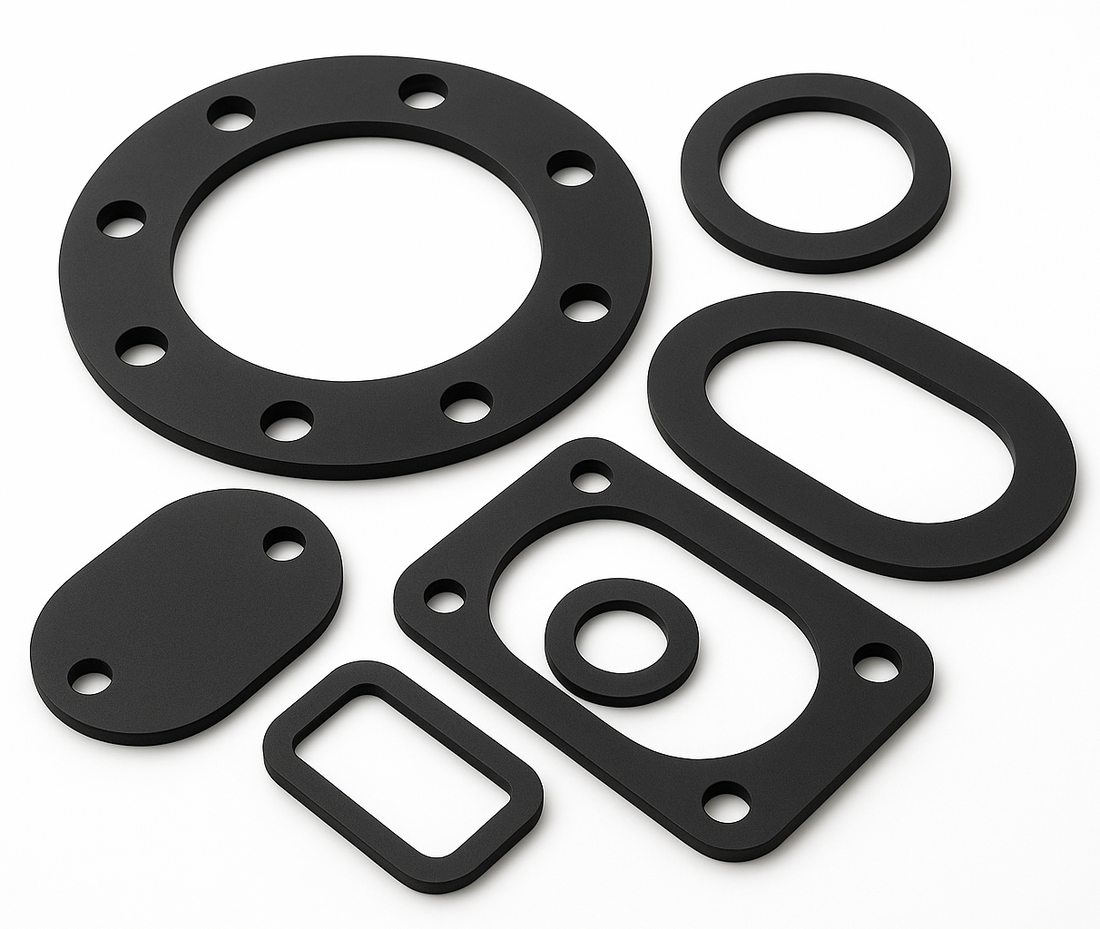
What is Viton Rubber: The Complete Guide to Fluoroelastomer Material Properties and Applications
Share
Viton rubber represents the pinnacle of chemical resistance and high-temperature performance in elastomer technology, offering unmatched durability in the most demanding industrial environments. This premium fluoroelastomer material provides exceptional resistance to aggressive chemicals, extreme temperatures, and harsh operating conditions that would destroy conventional rubber materials.
Whether you're an engineer designing sealing systems for chemical processing equipment, a maintenance manager sourcing gaskets for high-temperature applications, or a procurement professional evaluating materials for aggressive chemical environments, understanding Viton rubber's exceptional properties and capabilities is crucial for critical sealing applications. This comprehensive guide covers everything you need to know about Viton rubber, from its superior characteristics to technical specifications and cost considerations.
What is Viton Rubber?
Viton rubber is a high-performance fluoroelastomer composed of vinylidene fluoride and hexafluoropropylene, creating a polymer with extraordinary chemical resistance and thermal stability. This premium elastomer operates effectively in temperatures ranging from -15°F to 400°F (-26°C to 204°C) while providing exceptional resistance to acids, bases, solvents, and petroleum products that rapidly degrade conventional rubber materials.
The fluorine content in Viton's molecular structure creates an extremely stable polymer backbone that resists chemical attack, oxidation, and thermal degradation. This unique chemistry makes Viton rubber virtually inert to most industrial chemicals while maintaining sealing effectiveness under extreme operating conditions that would cause other elastomers to fail catastrophically.
Alternative Names for Viton Rubber
Viton rubber is referenced by several names and designations throughout the chemical processing and high-performance sealing industries:
Viton: The original trade name developed by DuPont (now Chemours), widely used as a generic term for fluoroelastomer materials.
FKM: The international designation for fluoroelastomer materials according to ASTM D1418 and ISO standards.
FPM: European designation for fluoroelastomer materials, commonly used in European specifications and documentation.
Fluoroelastomer: The generic technical term describing the material family, though Viton remains the most recognized name.
Kalrez: A perfluoroelastomer variant offering even higher chemical resistance, though significantly more expensive than standard Viton.
When specifying Viton rubber materials, both "Viton" and "FKM" are universally understood by suppliers and engineers, with FKM being more common in formal international specifications.
Key Properties and Advantages of Viton Rubber
Viton rubber offers exceptional advantages that make it essential for critical high-performance applications:
Superior Chemical Resistance: Viton demonstrates outstanding resistance to acids, bases, solvents, fuels, oils, and aggressive chemicals that destroy other elastomers, making it ideal for chemical processing applications.
Exceptional Temperature Performance: Operating reliably from -15°F to 400°F with some grades handling up to 500°F, Viton outperforms all other elastomers in high-temperature sealing applications.
Outstanding Aging Characteristics: The fluorinated polymer structure provides exceptional resistance to oxidation, ozone, and thermal degradation, delivering extended service life in harsh environments.
Excellent Compression Set Resistance: Viton maintains sealing force over extended periods under compression, ensuring reliable long-term sealing performance.
Low Gas Permeability: Superior barrier properties make Viton ideal for applications requiring minimal gas or vapor transmission through the seal.
Fire and Flame Resistance: Exceptional resistance to combustion and flame exposure, critical for safety-critical applications in chemical and petroleum industries.
Common Applications for Viton Rubber
Viton rubber's exceptional properties make it indispensable for demanding industrial applications:
Chemical Processing Industry: Reactor seals, pump gaskets, valve seals, pipe gaskets, and equipment sealing for aggressive chemical environments.
Oil and Gas Industry: Downhole sealing, wellhead equipment, high-pressure valve seals, and sealing components for sour gas applications.
Aerospace Industry: Engine seals, fuel system gaskets, hydraulic system seals, and components requiring extreme temperature and chemical resistance.
Automotive Industry: Transmission seals, fuel injection system seals, turbocharger gaskets, and underhood components exposed to high temperatures and aggressive fluids.
Pharmaceutical Industry: Process equipment seals, reactor gaskets, and sealing components for aggressive solvents and cleaning chemicals.
Semiconductor Industry: Chemical delivery system seals, process equipment gaskets, and components requiring ultra-high purity and chemical resistance.
Limitations and Unsuitable Environments
While Viton rubber provides exceptional performance, certain conditions can limit its application:
Cost Considerations: Viton costs 4-6 times more than general-purpose rubbers, making it economically suitable only when its superior properties are required.
Low-Temperature Limitations: Standard Viton becomes stiff below -15°F, requiring special low-temperature grades for extreme cold applications.
Steam and Hot Water: While chemically resistant, Viton can experience hydrolysis in high-temperature steam environments, requiring careful evaluation.
Strong Bases at Elevated Temperatures: Concentrated caustic solutions at high temperatures can attack certain Viton formulations over extended periods.
Amines and Ammonia: Some amine compounds and ammonia can cause swelling in certain Viton grades, requiring specialized formulations.
Types of Viton Rubber Available
Viton rubber comes in various specialized formulations for specific performance requirements:
Type A Viton: Standard grade offering excellent general chemical resistance and temperature performance for most applications.
Type B Viton: Enhanced chemical resistance, particularly to bases and amines, for more aggressive chemical environments.
Type F Viton: Improved low-temperature performance while maintaining chemical resistance for broader temperature range applications.
GLT (Gas-Low Temperature) Viton: Specialized formulation for improved low-temperature flexibility in gas and petroleum applications.
ETP (Extreme Temperature Performance) Viton: Enhanced high-temperature capability for applications approaching 500°F continuous operation.
Peroxide-Cured Viton: Superior compression set resistance and high-temperature performance for critical sealing applications.
Temperature Range and Operating Conditions
Viton rubber operates across an impressive temperature range of -15°F to 400°F (-26°C to 204°C) for standard grades, with specialized formulations extending this range to -65°F on the low end and 500°F on the high end. Optimal performance typically occurs between 0°F and 350°F for most applications.
For extreme low-temperature applications, GLT or Type F formulations provide improved flexibility. For continuous high-temperature service above 350°F, ETP grades or peroxide-cured formulations offer enhanced thermal stability and longer service life.
Chemical Compatibility
Viton rubber demonstrates exceptional resistance to mineral acids, organic acids, fuels, oils, solvents, hydraulic fluids, and most industrial chemicals. It resists swelling and degradation in environments that rapidly destroy nitrile, EPDM, and neoprene rubbers.
However, Viton rubber can be affected by hot concentrated caustic solutions, certain amines, ammonia compounds, and some specialty solvents. When chemical compatibility is critical for aggressive environments, consult detailed chemical resistance charts or conduct specific compatibility testing.
Price Comparison with Other Rubber Materials
Viton rubber represents a premium investment justified by its exceptional performance:
Viton vs. Nitrile: Viton costs 4-6 times more than nitrile rubber but provides superior chemical resistance, higher temperature capability, and extended service life in aggressive environments.
Viton vs. EPDM: Viton costs 5-7 times more than EPDM but offers exceptional chemical resistance and high-temperature performance that EPDM cannot match.
Viton vs. Neoprene: Viton costs 4-6 times more than neoprene but provides vastly superior chemical resistance and temperature performance for critical applications.
Viton vs. PTFE: Viton costs less than PTFE materials while providing superior elastomeric sealing properties, though PTFE offers better universal chemical resistance.
The higher cost of Viton rubber is typically justified by extended service life, reduced maintenance requirements, and prevention of costly failures in critical applications.
Installation and Handling Tips
When working with Viton rubber materials, follow these best practices for optimal performance:
Storage: Store Viton rubber in cool, dry conditions away from direct sunlight and contamination. The material's excellent aging characteristics allow for extended storage periods without degradation.
Installation: Use compatible lubricants during installation, avoiding petroleum-based products that may affect sealing surfaces. Fluorinated lubricants or compatible synthetic lubricants work best.
Surface Preparation: Ensure sealing surfaces are clean and free from scratches or imperfections that could compromise the seal, as Viton's superior properties justify careful installation practices.
Temperature Cycling: Allow for thermal expansion and contraction in high-temperature applications, ensuring proper flange design accommodates Viton's thermal movement.
Technical Specifications We Offer
We stock Viton rubber sheets in comprehensive size ranges to meet demanding high-performance sealing requirements:
Available Thicknesses: 1/32", 1/16", 3/32", 1/8", 3/16", 1/4", 3/8", 1/2", 5/8", 3/4", and 1" thick sheets
Sheet Widths: Available in 36" wide and 48" wide formats to accommodate large gasket applications while minimizing material waste
Durometer Options: Standard durometers range from 40 to 70 Shore A hardness. Custom durometers available for specialized applications requiring specific hardness properties.
Length Options: Flexible length options from 5 linear feet for small critical applications up to full 50-foot rolls for large-scale chemical processing projects
All Viton rubber sheets meet ASTM D1418 and AMS specifications and are suitable for precision cutting using CNC knife cutting, waterjet cutting, or die cutting methods depending on your application requirements and geometric complexity.
Viton rubber represents the ultimate choice for applications demanding exceptional chemical resistance, high-temperature performance, and long-term reliability in harsh industrial environments. Its superior properties justify the premium cost when conventional elastomers cannot provide adequate service life or safety margins.
When specifying Viton rubber for critical applications, consider the extreme environmental conditions, chemical exposure, temperature requirements, and safety implications. Our comprehensive inventory of Viton rubber sheets in various thicknesses, widths, and durometers provides access to the highest-performance sealing materials for your most demanding applications.
Need premium Viton rubber for critical high-performance sealing applications? Browse our online store to view current Viton inventory and place orders for immediate shipment, or contact us at info@modernrubberproducts.com to discuss custom cutting services and receive a quote for precision-cut Viton gaskets engineered for your most demanding chemical resistance and high-temperature sealing requirements.
